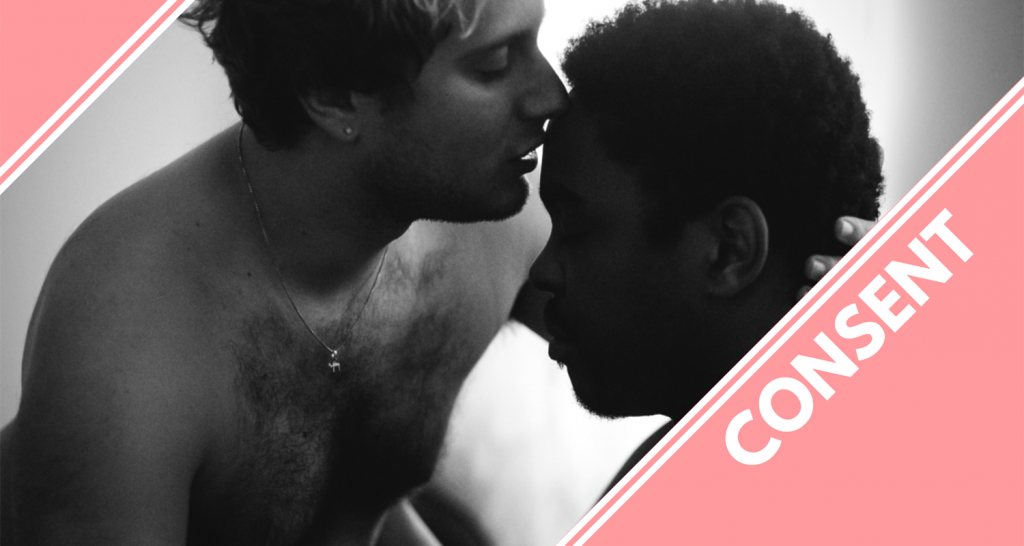
Consent
What is Consent?
Consent is asking for permission from your partner before you engage in any sexual activity or when changing sexual positions.
Non-consensual sex is considered rape or sexual assault. So it’s incredibly important to get consent not just to avoid a potential criminal offence or physically and emotionally harming your partner but when we’re able to have frank discussions about sex with our partners, the sex that we do choose to have tends to be more pleasurable, safer and generally just better.
So how do I ask for consent?
You need to ask if your partner or partners wants to have sex and what type of sex are comfortable with having. This needs to happen immediately before you have sex. Even if you and your partner have arranged to have sex at a specific time, date and location – you still need to ask for consent before you start having sex. This is because your partner’s mind could’ve changed in between the time you took to arrange the hook up and actually having sex.
Remember to ask what positions they feel comfortable with before doing anything. And when you’re changing positions remember to ask first.
Doesn’t asking for consent ‘ruin the mood’ ?
People often wrongly assume that asking for consent is a very stuffy and solemn conversation that is unromantic, unsexy and totally ruins the mood. But consent isn’t just mandatory, it’s sexy! It’s just about how you phrase it:
- Does it feel good when I touch you there?
- Do you want me to go down on you?
- Do you want me to keep going?
- Does that feel good?
- Do you want me to hit it from the back?
All of these things count as asking for consent.
Do I just need to ask for consent before I have sex?
No! You should also be asking for consent whenever you’re changing sexual positions too.
We’d recommend checking in with your partner or partners often throughout sex to see if they’re still experiencing pleasure, if they’re comfortable or even if they’re still ‘into it’.
Communicating with your partners like this is isn’t just great for getting consent, it’s the foundation for great sex!
So how do you know you’ve gotten consent?
You need to get an enthusiastic yes from your partner.
Silence or not saying does not count as consent.
Consent cannot be forced or coerced. If someone says no to having sex with you or having sex in a particular position and you continue to pressure them until they say yes, that’s not consent that’s sexual coercion. If someone feels they cannot say no for fear of violence or abuse that is not consent, that’s coercion.
Just because someone has agreed to, let’s say, oral that doesn’t mean they consent to all sexual activities. So make sure that before you have sex you’ve discussed with them what positions they’re comfortable with doing and you’re asking for consent when you’re changing sexual positions.
Remember that people can change their mind and that you have to respect that. Doesn’t matter if you’ve bought them dinner, if they’re buck naked in front of you, if you’ve just put on a condom or even you’re already having sex together – if they say they don’t want to have sex anymore. You have to stop otherwise that could be rape or sexual assault.
What are somethings that don’t mean consent?
- Not saying no or being silent.
- Having had sex with them before.
- Being in a relationship with them.
- Agreeing to come back to yours, or them inviting you home to theirs.
- What they’re wearing
Nothing equals consent other than an enthusiastic verbal yes!
Some situations where you can’t get consent even with an enthusiastic yes
The age of consent in Northern Ireland and the UK is sixteen. If your partner is under the age of consent, the law states that they can’t consent to sex even if they give an enthusiastic verbal yes.
If your partner is too drunk or too high. Lots of us like to experiment with drugs and alcohol during sex. If you’re a bit tipsy or a bit stoned – that’s fine. But use your common sense, if someone is:
- Slurring their words
- Struggling to stand upright
- Their eyes are rolling to the back of their head
- Struggling to stay conscious
Then that person is too intoxicated and definitely cannot consent to sex, even if they say yes.
A good rule of thumb is, if you wouldn’t trust that person in their current state behind the wheel of a car then they’re too intoxicated to give consent freely.
If they’re asleep or unconscious then they are unable to give consent. Even if they’d just given you consent and immediately afterward fallen asleep or become unconscious you have to stop. This because someone who is unconscious or asleep cannot say no anymore.
If there’s a power imbalance between you and your partner. For instance, if you are their police officer, teacher, spiritual leader or social worker etc. People in these roles have to follow professional working boundaries with clients, and should not be having sex with people in their care. As having sexual relationships with people you have power over can create situations where your partner might feel they have to say yes to sex to remain in their good favours.
So remember
Sex starts with consent. Which must be an enthusiastic verbal yes!
Great sex continues by asking for consent when you’re changing positions and checking in with your partners to make sure if they’re still experiencing pleasure, if they’re comfortable or if they’re still ‘into it’.
Consent is given voluntarily, not coerced, forced or pressured.
Someone can change their mind at anytime before or during sex. You must respect that and stop. Otherwise it could be rape or sexual assault.
You can’t get consent from someone who is under the age of sixteen, too drunk or too high or from someone in your professional care – even when they give you an enthusiastic verbal yes.
